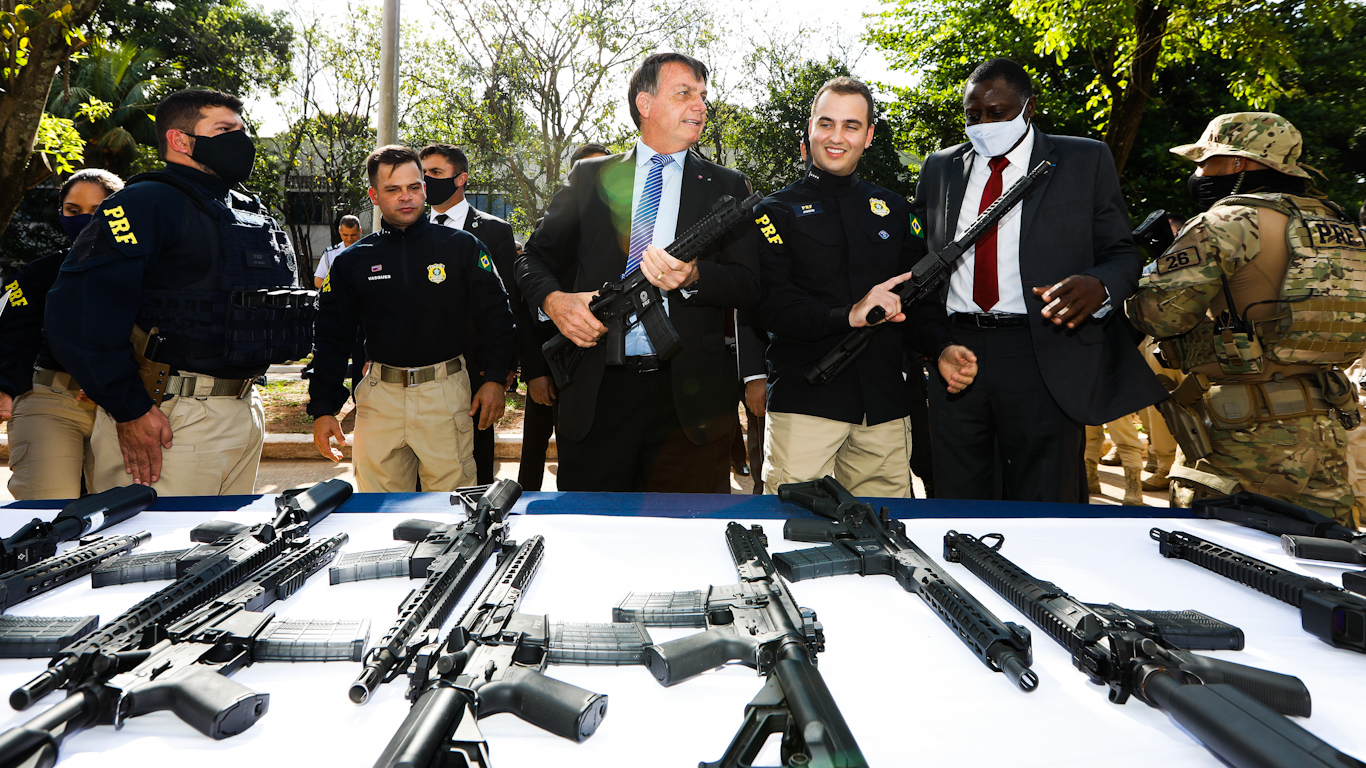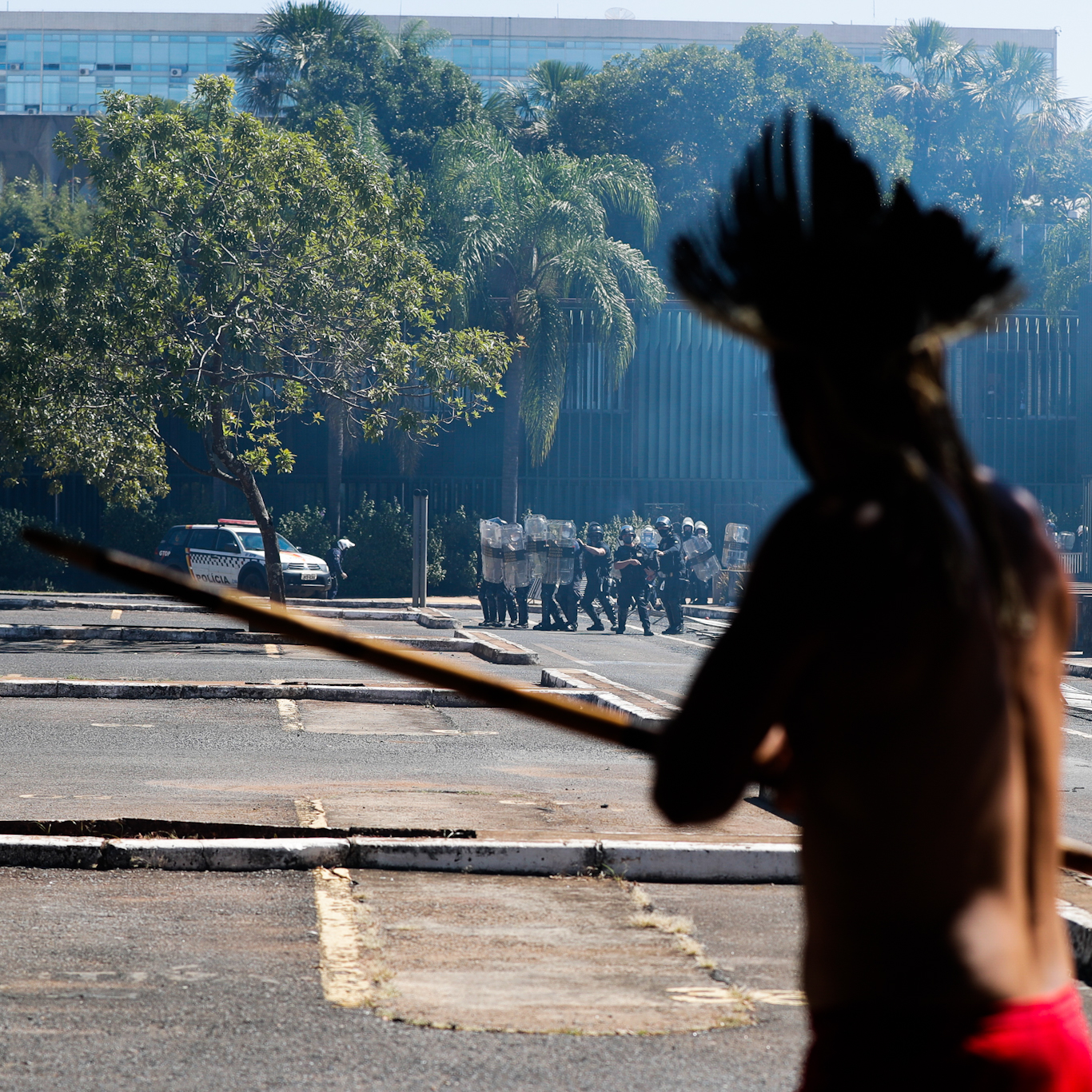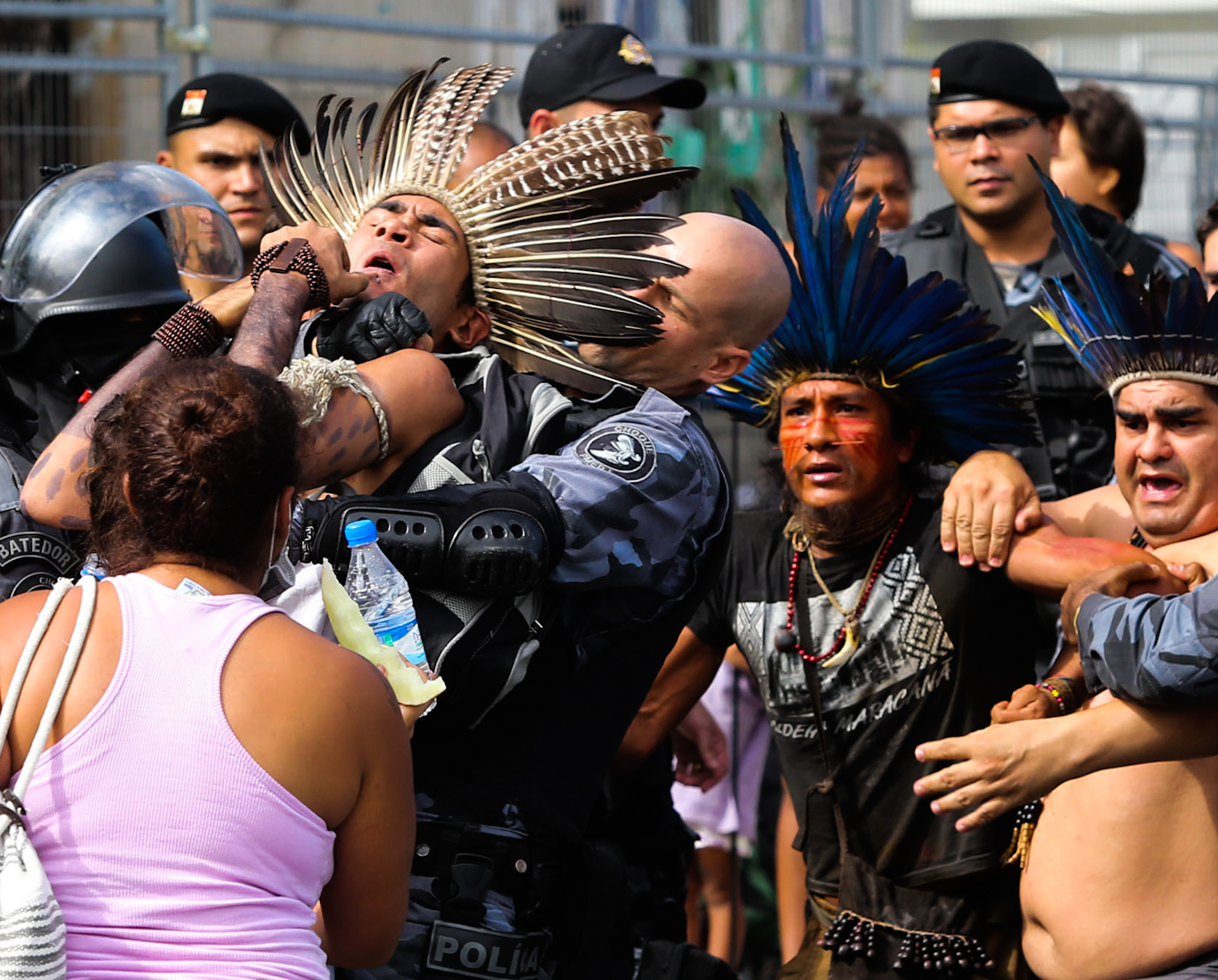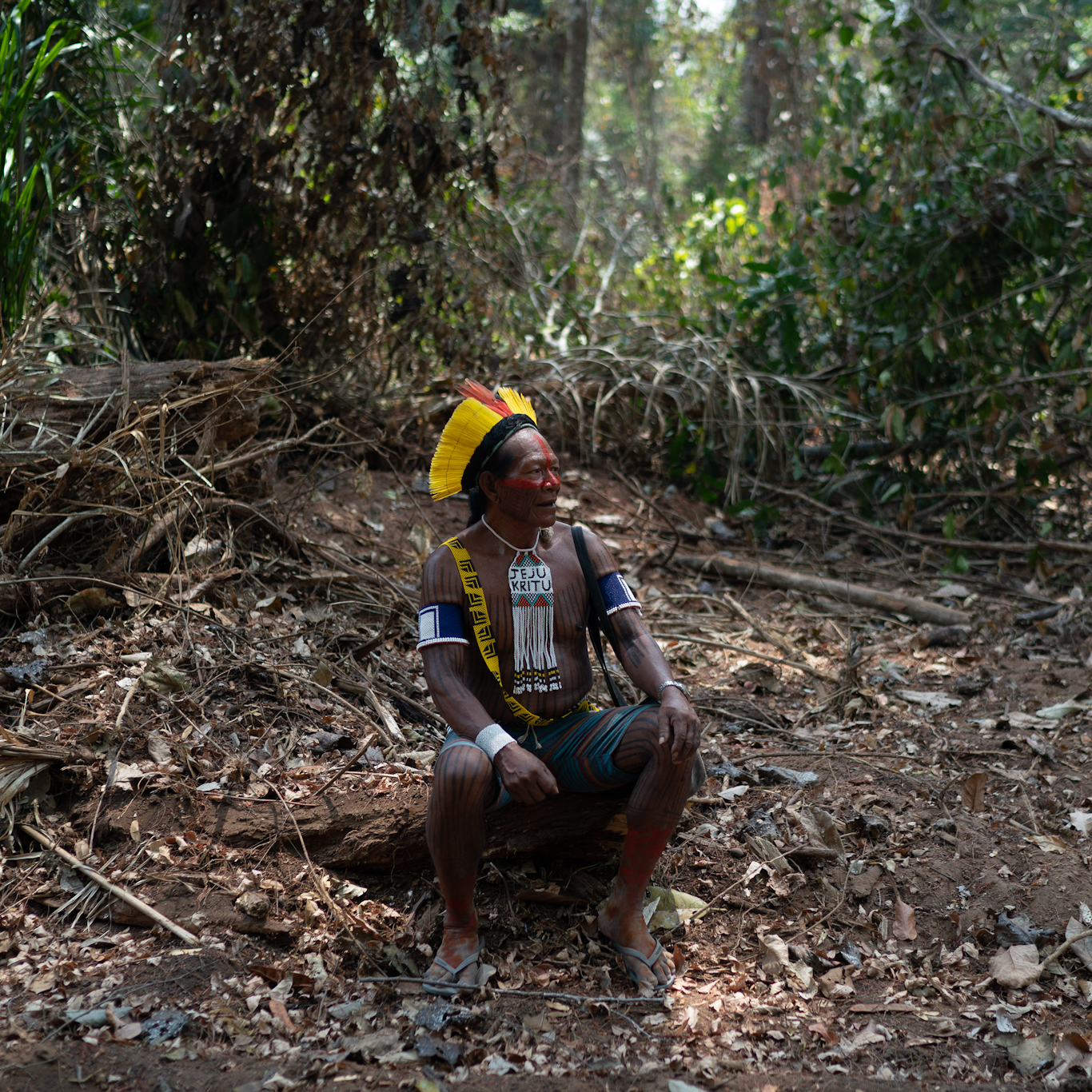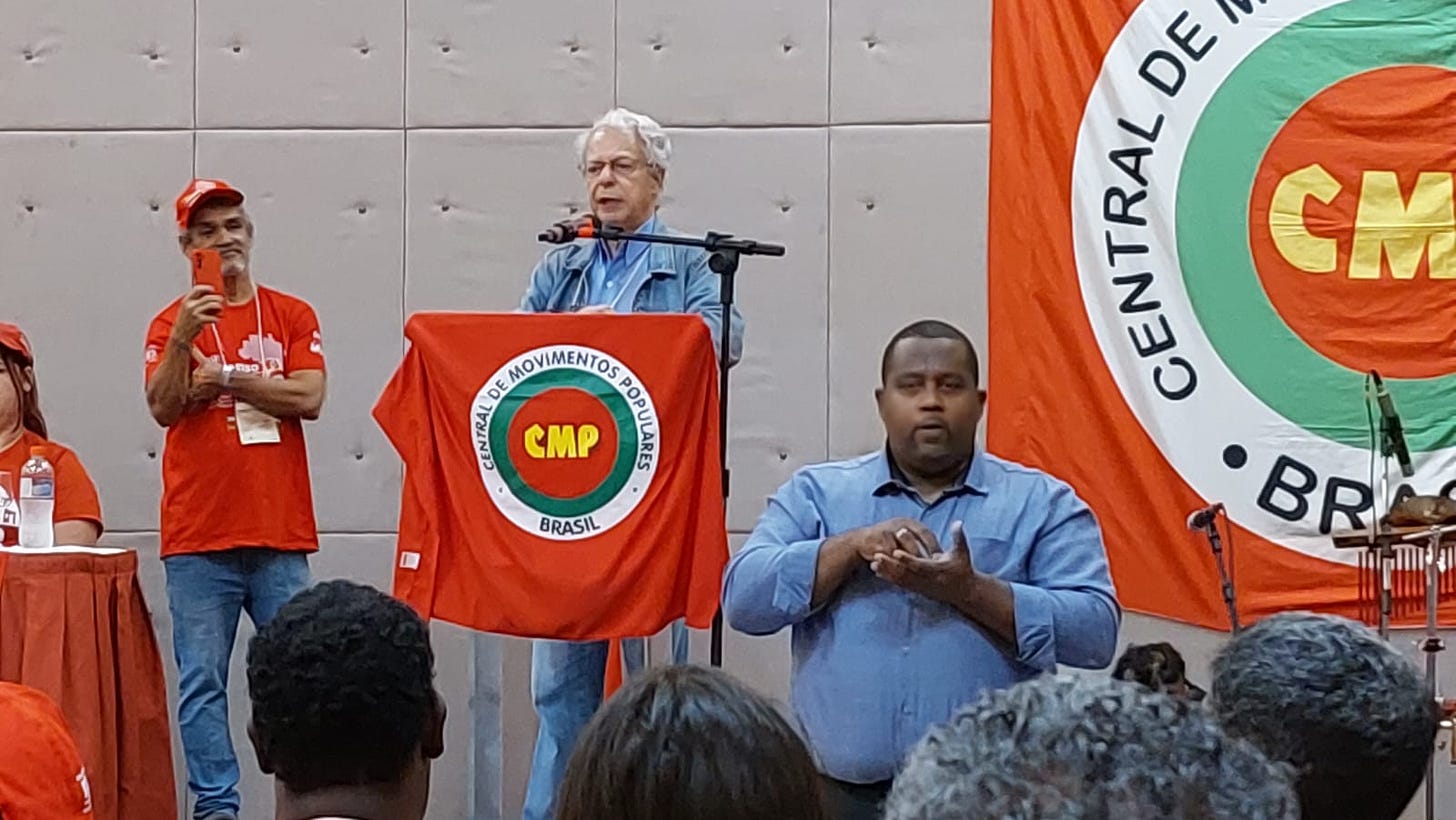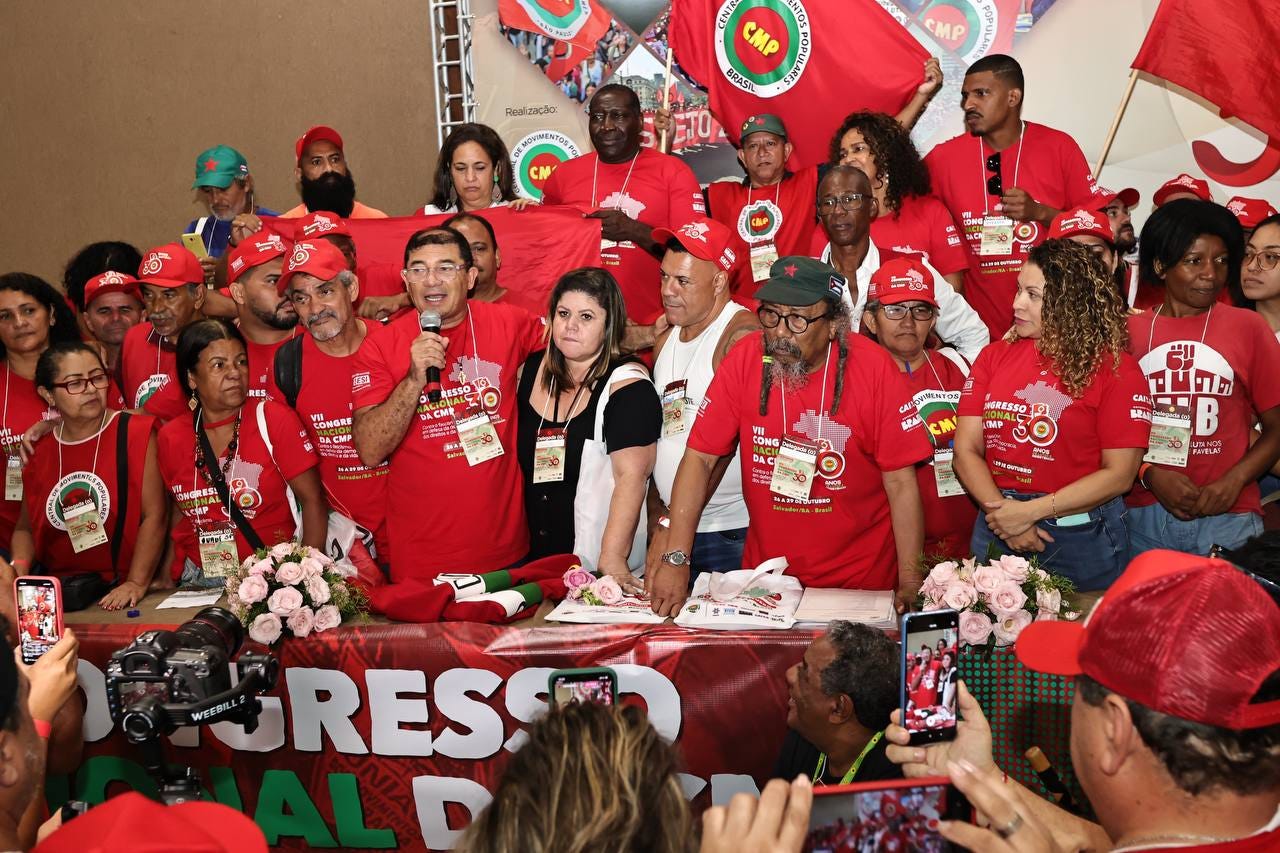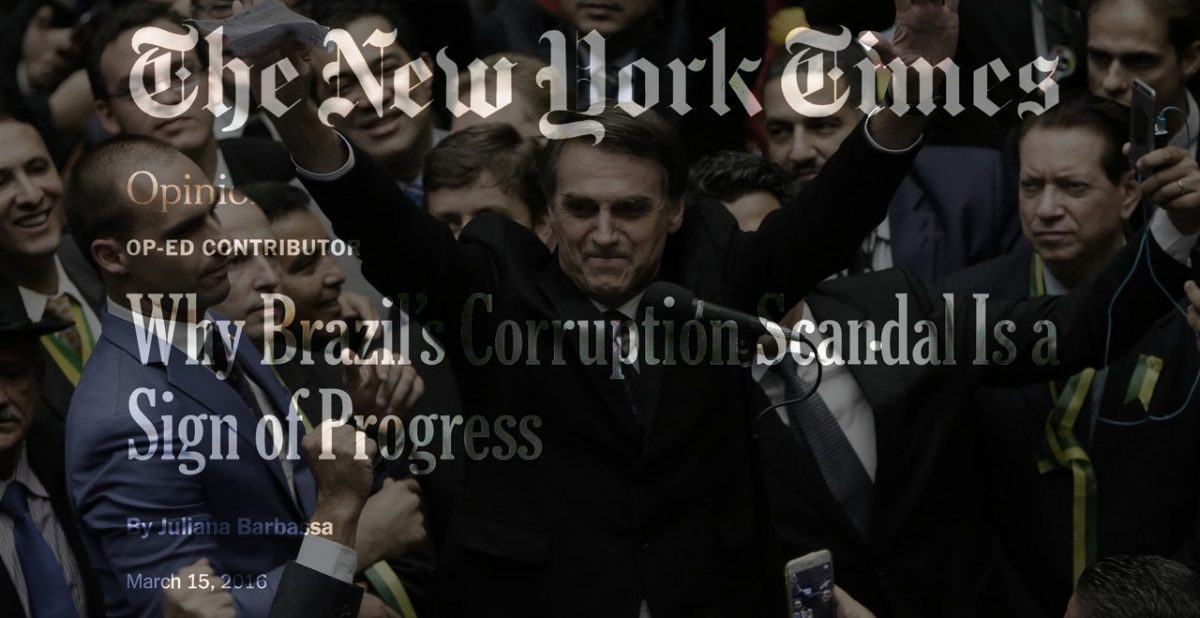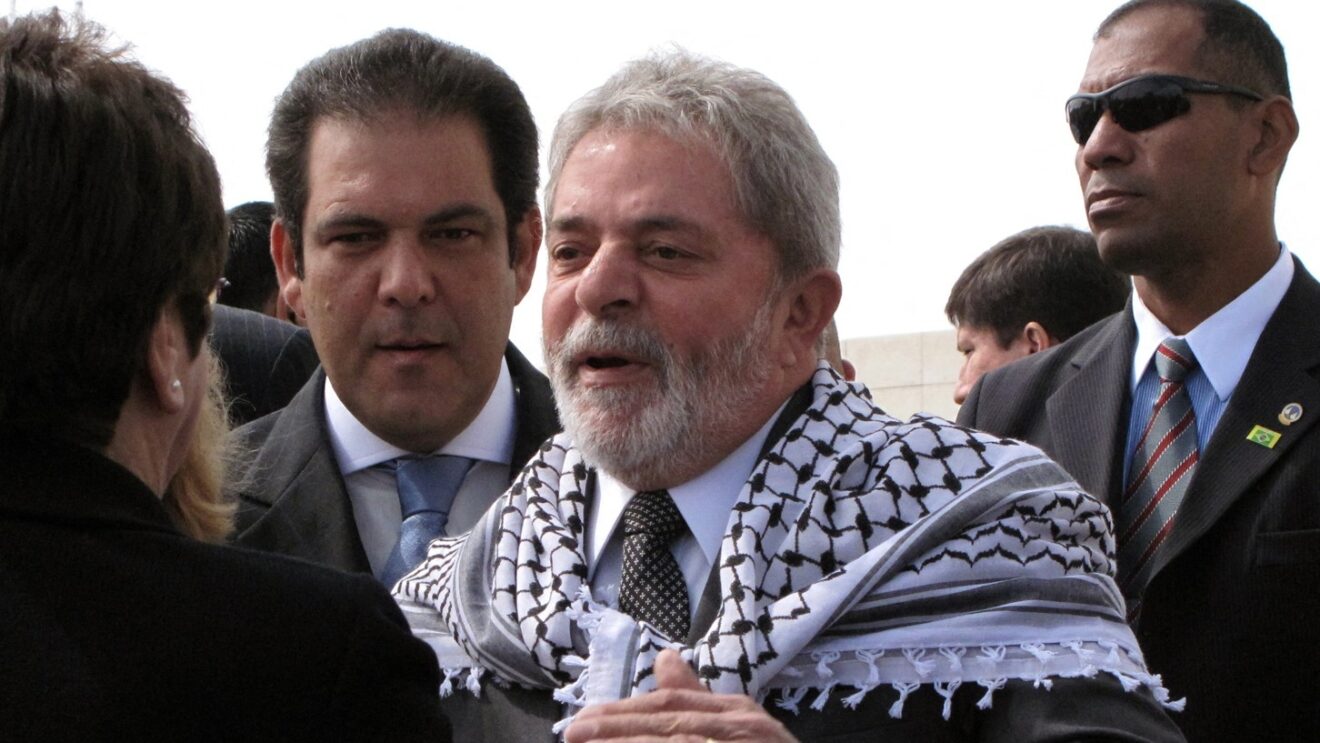For Forty Years, Brazil’s Landless Workers Have Fought to Build Humanity: The Sixteenth Newsletter (2024)
Against the terrain of Brazil’s wretched social hierarchies, the Landless Workers' Movement (MST) of Brazil seeks to deepen its solidarity with Palestine. This newsletter and our April dossier look at the MST's tactics and organisational methods – such as solidarity – forty years since its foundation.
APRIL 18, 2024

Artwork by Vienno.
Dear friends,
Greetings from the desk of Tricontinental: Institute for Social Research.
Brazilian landless workers, who live on settlements and encampments of the Landless Workers’ Movement (MST), gathered roughly 13 tonnes of food to send to Palestinians in Gaza between October and December 2023. MST cooperatives across the country participated in the solidarity campaign, which included milk from Cooperoeste in Santa Catarina, rice from Terra Livre Cooperative, the Cooperative of Settled Workers of the Porto Alegre Region (Cootap), and Cooperav in Rio Grande do Sul, and corn flour from Terra Conquistada in Ceará. The aid was sent to the Palestinian Agricultural Workers’ Union through the Brazilian Air Force. ‘The Palestinian people, like all the peoples fighting for their sovereignty, need the solidarity actions of other peoples’, said Jane Cabral of the MST national leadership. Indeed, the world must follow the example of Brazil’s landless workers.
Collecting food has only been one aspect of the MST’s solidarity action with the Palestinian people. The other equally important aspect has been about building a consensus in Brazil regarding Israel’s genocide in Gaza. Over the past several decades, the right-wing evangelical movement in Latin America has promoted a pro-Israeli political agenda in Brazil and elsewhere. This movement defends Israel in the hope that it will destroy the al-Aqsa mosque in Jerusalem and build the ‘Third Temple’. Under this view, the temple will open the door to the return of Christ, and all non-Christians, including Jews, will be subjected to eternal damnation. Evangelical pastors in Latin America – many of them funded by US-based Christian Zionist groups such as Christians United for Israel – have spread this deeply hateful, anti-human view. This is an important reason why right-wing leaders in the region, including former Brazilian President Jair Bolsonaro and current Argentinian President Javier Milei, are staunch defenders of Israel and the Zionist project. As such, the MST’s mass drive to collect food for Gaza was also a campaign to contest the growth of Christian Zionism in Brazil, advocate for the rights of the Palestinian people, and deepen education about and ties with the Palestinian struggle amongst its base.
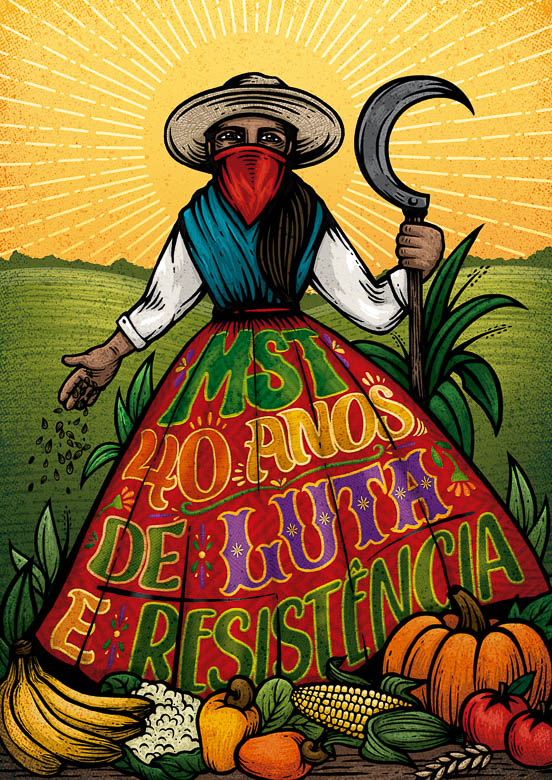
Artwork by Judy Duarte.
The MST, with its nearly two million members, is the largest socio-political movement in Latin America and one of the largest peasant movements in the world. Since it was born forty years ago, in 1984, the MST has grown steadily because of its unique approach to building and maintaining its base among landless workers. Our latest dossier, The Political Organisation of Brazil’s Landless Workers’ Movement (MST), examines the theoretical orientation that has enabled the MST to build this remarkable organisation on the terrain of Brazil’s wretched social hierarchies, which are rooted in the legacy of Portuguese colonialism, genocide, slavery, and US-backed military dictatorships. The art for the dossier, which is also featured in this newsletter, was created for the ‘Forty Years of the MST’ call for art organised by the MST, Tricontinental: Institute for Social Research, ALBA Movements, and the International Peoples’ Assembly. The second monthly bulletin from Tricontinental: Institute for Social Research’s art department will focus on that exhibition; you can subscribe to it here.
The MST has three goals: to fight for land, to fight for agrarian reform, and to transform society. Based on Brazil’s 1988 Constitution, the MST organises landless workers to seize unproductive land and build settlements (assentamentos) and squatters’ encampments (acampamentos). At present, nearly half a million families live on such settlements and have gained legal tenure of the land, where they have built 1,900 peasant associations, 185 cooperatives, and 120 MST-owned agro-industrial sites, with an additional 65,000 families living on encampments and fighting for legal recognition. It is these institutions that produce the goods sent to Palestine. Despite the unequal balance of forces in Brazil, where the capitalist class enforces its rule over the economy and the countryside through domination of the state, the MST has been able to build its strength over the years and currently operates in twenty-four of the country’s twenty-six states. This strength is a product of the MST’s mass base and its organisational methods. As the dossier explains, a crucial aspect of the MST’s organisational theory is the idea that the assentados, the residents of the agrarian reform settlements, must always be in motion. There are seven organisational principles that allow the MST to drive this motion: its autonomy in relation to political parties, churches, governments, and other institutions, for which organisational unity is essential; the training of organisers both to participate in building the organisation and to be disciplined with respect to the decisions of the collective leadership; the importance of study; and the necessity of internationalism.
The MST does not only fight for land; it also seeks to enact agrarian reform and transform society. In other words, it seeks to change the very nature of agrarian capitalism and construct a model of agroecology that develops a balanced and sustainable form of agriculture – one that harnesses nature rather than degrades it and produces healthy food for society at large.

Artwork by Duda Oliva.
There are now over 2.4 billion people in the world who are food insecure. More and more famines are breaking out, from Sudan to Palestine, often related to conflicts of different kinds. Meanwhile, we are in the midst of the United Nations Decade of Family Farming, which began in 2019 and will close in 2028. The UN’s Food and Agricultural Organisation (FAO) calculates that family or small farmers produce a third of the world’s food and up to 80% of the food in sub-Saharan Africa and Asia. Yet these small and family farmers do not control the land that they till, nor do they have the capital to increase their productivity. As a consequence, many small farmers produce food for the market but not enough to feed their families, leading to an epidemic of hunger amongst millions of small farmers and peasants.
As the FAO notes, ‘The majority of the 600 million farms in the world are small. Farms of less than one hectare account for 70% of all farms but operate only 7% of all agricultural land’. This great inequality in land ownership is at the heart of the work of the MST, as well as organisations around the world such as Mviwata in Tanzania (about whom we will be publishing a dossier later this year) and the All India Kisan Sabha in India (whom we wrote about in our June 2021 dossier, The Farmers’ Revolt in India). It is for good reason that the 16 million-member Kisan Sabha, for instance, joined the Boycott, Divestment, and Sanctions (BDS) movement against apartheid Israel in 2017 and why Mviwata, which represents 300,000 peasants, condemned Israel’s genocide of Palestinians at its annual meeting in December 2023. These farmers and peasants know that their task is not only to redistribute land, but to transform society across the world.
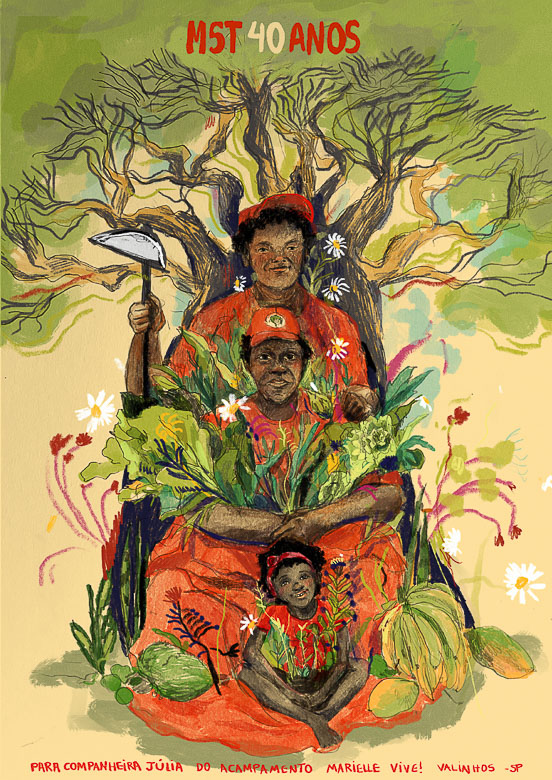
Artwork by Natália Gregorini.
In 1968, Thiago de Mello (1926–2022), born in Brazil’s Amazonas, was sent into exile for his criticism of the military dictatorship. He went to Chile, where he befriended Pablo Neruda. Before long, de Mello was again forced to flee a military dictatorship, chased out of Chile because of the 1973 coup against the socialist project led by then President Salvador Allende. De Mello first went to Argentina and then to Europe. It was during this flight, in 1975, that he wrote his classic poem Para os que virão (‘For Those to Come’), the last few lines about the hurt that must be overcome by people who come to fight for social transformation:
It doesn’t matter if it hurts: it’s time
to move forward hand in hand
with those walking in the same direction,
even if it’s a long way off
from learning how to conjugate
the verb to love.
Above all, it’s time
to stop being just
the solitary vanguard
of ourselves.
It’s about meeting.
(The clear truth of our mistakes burns limpid and hard in our chests)
It’s about opening the way.
Those who will come will be the people,
and they will know themselves by fighting.
Happy fortieth birthday to the MST! Don’t forget to read our dossier, here, recommended by one of the movement’s founders, João Pedro Stedile:
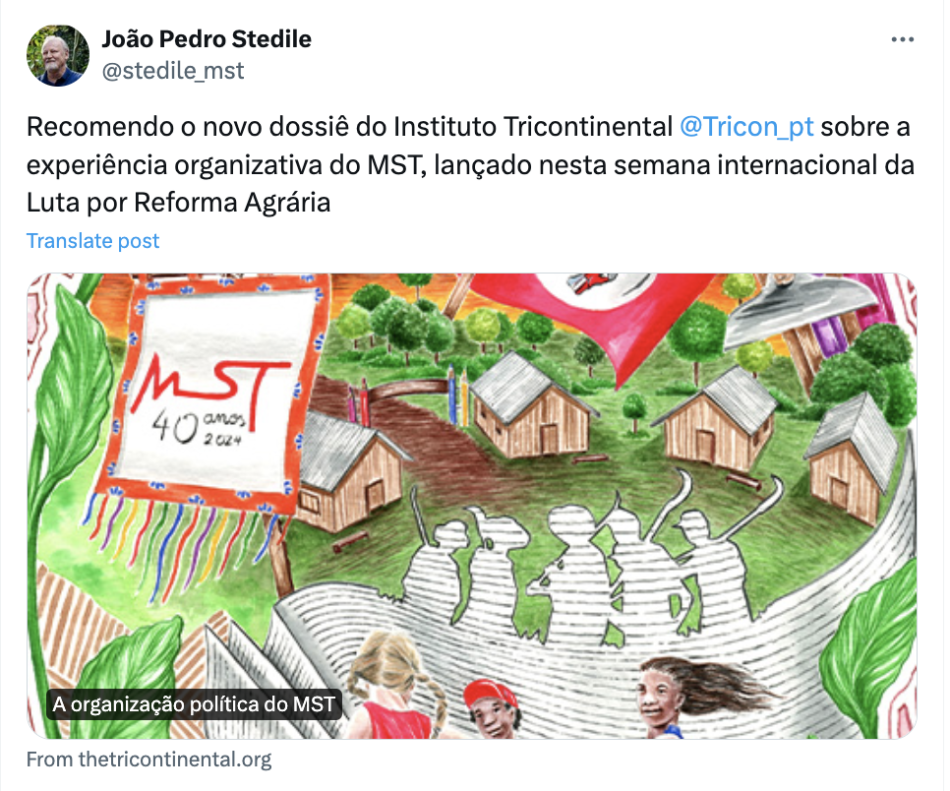
‘I recommend the newest dossier from Tricontinental: Institute for Social Research about the MST’s organising experience, launched during this International Week of Peasant Struggle’.
Warmly,
Vijay
https://thetricontinental.org/newslette ... -40-years/
******
For Brazilian social movements, Lula’s program for agrarian reform doesn’t solve urgent problems
Peasant organizations point out that the announced measures do not tackle the country’s land concentration
April 18, 2024 by Gabriela Moncau
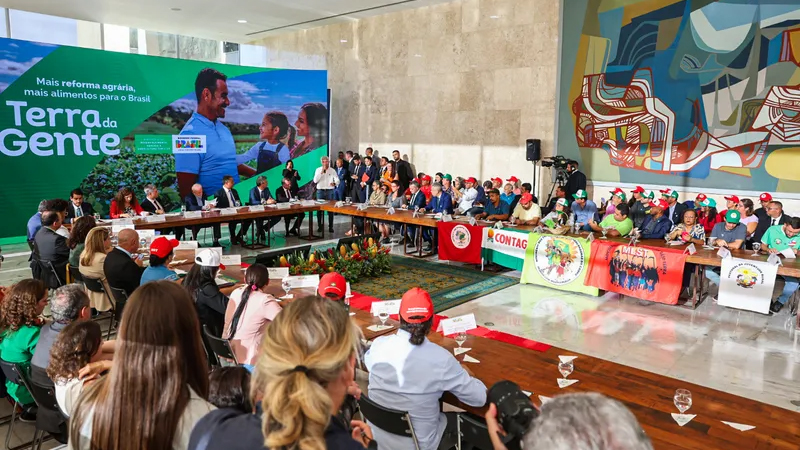
The Terra da Gente Program was launched in Brasilia last Monday (Photo: Valter Campanato/Agência Brasil)
In 11 Brazilian states, 28 large estates were occupied by the Landless Rural Workers’ Movement (MST) in the space of a week, as part of the traditional national day of struggles held in April in memory of the Eldorado do Carajás massacre. The number already exceeds the number of such actions carried out by the movement in 2019, 2020 and 2021, according to a survey by the Pastoral Land Commission (CPT). It is in this context that, under pressure from Brasília, on April 15, the Lula government launched the Terra da Gente Program.
The decree provides alternatives for the acquisition of rural properties by the federal government to be used for agrarian reform. Among the options are the use of land that already belongs to the Union, the negotiation of state debts in exchange for land, the purchase of properties from banks and public companies, the acquisition of pledged properties and adjudicated land (when landowners exchange land for settling debts).
In the opinion of the MST and the CPT, the program is important because it is a “gesture” by the government in response to the demand for progress in land reform and presents “interesting” options for improving access land in the medium term.
However, for the organizations, the measures do not affect the concentration of land in the country and do not resolve urgent short-term issues, such as reducing bureaucracy in farmers’ access to credit and the settlement of 105,000 families living in encampments in Brazil.
“It’s social compensation, not agrarian reform”
“In general, there are good ideas for [improving access to] land in our country,” observes Gilmar Mauro, from the national coordination of the MST. “But I really don’t see a solution to one of the main problems, which is the number of encamped people in Brazil, in the short term,” he says.
“Nor did the issue of funding for the settlements come up. It’s always good to remember that there are almost four million small farmers and that the amount of credit released for family farming has reached one million. These are the farmers who are economically viable,” says the MST leader.
“We have no concrete policy for the rural poor. We need a kind of ‘unwinding’ to resolve the problems and debts of this part of the population, which produces this country’s food,” proposes Gilmar Mauro.
For Isolete Wichinieski, from the CPT’s national coordination, the federal government has been tackling social problems, “but at a slow pace.” “We defend the de-concentration of land and we’re not seeing that in the Lula government,” she said. “[The government] is trying to solve hunger with a very welfare-oriented approach, without attacking the root of the problem, wherein land is one of the main issues,” he says.
“We’ve seen improvements in programs that have been re-imposed in the production line, such as the Food Acquisition Program (PAA) and credit for productive backyards. But there are still basic issues that we need to restructure in terms of an agricultural and agrarian policy for the countryside, which this government has yet to show what it’s come for,” Isolete points out.
In the same vein, Gilmar Mauro believes that Terra da Gente “is a kind of social compensation, a settlement program, the fruit of struggle. Which is obviously important. But it doesn’t tackle the concentration of land in our country. That’s why it’s not an agrarian reform program.”
Land but “without a lot of fighting”
President Lula has claimed that the ownership of rural properties can be transformed “without a lot of fighting” in a program called “Terra da Gente” which would create “land allotment shelves”.
In this new decree, the ways of acquiring these lands include expropriation (when the government buys the land from the owner in order to use it for social purposes) and expropriation (when the area is taken by the state for having failed to comply with labor or environmental laws, for example). Both tackle the concentration of land in the country. However, there are no signs that these resources will be used as a priority.
Firstly, because of the low budget for expropriations. The investment for land reform foreseen in the 2024 Annual Budget Law is Rs 659 million. This is the lowest amount planned for the area of all previous PT administrations. Between 2003 and 2016 there was no year in which this budget was below Rs 2.5 billion.
Secondly, the Minister for Agrarian Development and Family Farming, Paulo Teixeira, said on April 17 at a press conference with radio broadcasters that the strategy is to avoid conflicts and apply “more innovative” methods than expropriation.
“In the past we had the expropriation system where, after going to court, there was a whole debate, the issue went through several courts and after about 10 years you [/img]could acquire the land. We’re changing that,” said Paulo Teixeira.
“In the previous period, how did you settle families? You did it by law, because the land was unproductive. The land was expropriated for land reform purposes. But it’s a lengthy process and you’re always going to allocate unproductive land. It’s like giving those families an old car, so to speak. That’s what we’ve innovated,” said the minister.
In his speech launching the program at the Planalto Palace, Lula stressed that the survey of land available for settlements “does not invalidate the continuity of the agrarian reform struggle, but we want to show Brazil what we can use without a lot of fighting. This is without asking anyone to stop fighting.”
In Gilmar’s opinion, the government has been trying to “appease conflicts” since the beginning of the administration. “As if, if there was no pressure from the popular movements, the landowners would stay quiet, right? That doesn’t happen, of course. You have to put pressure on them. If the MST were to fall for the ‘now sit down and we’ll do something about it’ line, it would mean settling for a historically archaic land tenure structure,” he points out.
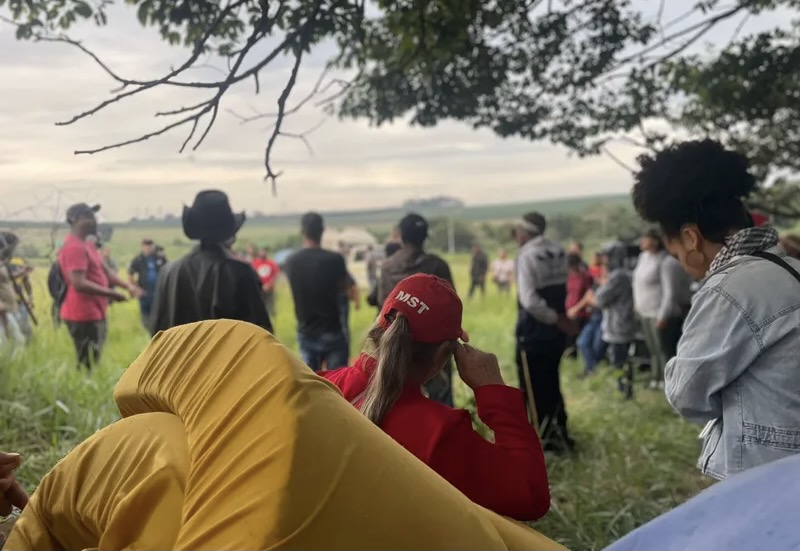
On April 17, the MST totaled 28 occupations of unproductive land in Brazil in one week. The occupations in 10 states plus the Federal District involve around 20,000 families and are part of the traditional National Days of Struggle organized by the MST in April. This year, the slogan is “Occupy to feed Brazil”.
The most recent encampment was set up by 200 families in the early hours of Wednesday morning at Coqueirinho Farm, in the municipality of São Mateus.
In a “letter to the Brazilian people” on “the milestone of April 17, 2024”, World Day of Struggle for Land, the MST explains the main demands of the national day, with criticism of what they consider to be insufficient agrarian reform policies of the Lula government.
In addition to 28 occupations, the MST carried out 40 actions such as marches and vigils in 17 Brazilian states this April. Photo: Gabriela Moncau/Brasil de Fato
“We are fighting because 105,000 families are encamped and we demand that the federal government comply with article 184 of the Federal Constitution, expropriate unproductive estates and democratize access to land,” says the MST letter, stressing that “settling is more than distributing or regularizing land”, but also guaranteeing access to policies that “allow for the full development of people and communities in the countryside”.
The movement is also demanding basic infrastructure and technical assistance in the settlements, a new budget for public policies such as the Food Acquisition Program (PAA), the formation of food stocks, price regulation and resources to “make the 42 courses already approved in the National Education Program for Agrarian Reform (Pronera) viable”.
“Patience is the enemy of hunger and abandonment for those under a black tarp,” the MST said in the letter. Last Monday, while dozens of large estates were being taken over by landless people, the federal government launched the Terra da Gente program in Brasilia.
At the event, President Lula and Agrarian Development Minister Paulo Teixeira announced 17 legal ways to obtain and make land available for agrarian reform, the so-called “land allotment shelves”.
Among the options are the allocation of federal land for agrarian reform, the purchase of properties from banks and public companies and the negotiation of state debts with the federal government in exchange for land.
“The government bringing agrarian reform onto the agenda was an important step,” says Ceres Hadich, from the movement’s national coordination, “but it will only be consolidated if we fight hard.” The days of struggle, which also involves actions such as marches, encampments, vigils at Incra and food donations in 17 states, runs until next Friday.
“The occupation is a necessary condition to show society that one, there are people who need land. Two, there is unproductive land. Three, it is in the struggle that one conquers [land]. It is therefore also an instrument of communication,” says Gilmar Mauro, from the MST’s national coordination.
“If someone says there’s no more land for expropriation, we show them ‘look at this [piece of land] that doesn’t fulfill its social function, look at this one with slave labor, this one with environmental degradation, this vacant public land’,” he points out. “It’s a powerful instrument of struggle that obviously wasn’t created in a cabinet. It was created by the people,” he says.
“So these days of struggle were and are fundamental and it was great, it was good. Almost all the states have mobilized. And we’re not finished, the struggle continues,” says Gilmar Mauro.
13 occupations in Pernambuco alone
So far, Pernambuco is the state with the highest number of land occupations this Red April. From Sunday 14 to Wednesday 17 there were 13, involving 5,301 families, according to the MST.
These include the occupation of land belonging to the Farm Fruit company in Santa Maria da Boa Vista (PE), the National Department for Works against Droughts (DNOCS) in Serra Talhada and the Brazilian Agricultural Research Corporation in Petrolina (PE).
The latter was occupied by the MST twice last year. “In 2023 we left Embrapa with a commitment to settle the 1,316 families who were camped there. But that wasn’t fulfilled and now we’re coming back to demand it,” explained Jaime Amorim, from the national coordination of the MST in Pernambuco.
Camps were also set up in Sergipe, São Paulo, Goiás, Rio Grande do Norte, Paraná, the Federal District, Ceará, Rio de Janeiro, Espírito Santo and Bahia.
Conflicts and evictions
Two of the occupations carried out by the MST this Red April were violently evicted by police forces without a court order. One of them in Vila Boa de Goiás (GO), on the outskirts of the Federal District; the other in Campinas (SP).
The Military Police of Ronaldo Caiado’s government (União Brasil) forcibly removed around 1,000 families who had occupied a bankrupt 8,000-hectare area of the Companhia Bioenergética Brasileira (CBB) plant.
The area of around 8,000 hectares is under embargo for environmental crimes, according to the Ministry of the Environment. According to the MST, the occupation took place to press for the expropriation of the plant, which was offered to the Union as a way of paying off tax and labor debts of around Rs 300 million.
“They arrived with a police force of 15 vehicles,” describes Marco Baratto, state leader of the MST in the Federal District. He and four other activists were arrested and later released. “There’s no law here, it’s lawless,” he says. “But we’re standing firm, the families are mobilized,” he adds.
The other eviction was carried out by the Campinas Municipal Civil Guard (GCM) against around 200 families in an unproductive area owned by a real estate company, Zezito Empreendimentos Ltda.
The mayor of Dário Saadi deployed guards to carry out the eviction with bombs and rubber bullets and even a German shepherd, relying on Decree No. 16,920, which creates a “Group for the Control and Containment of Occupations, Clandestine Land Parcels and Environmental Damage”. The provision, however, was not even respected. Among the requirements for the repossession, for example, is the registration of the families, which did not take place.
The report witnessed that, acting in the name of a decree whose function is, among other things, to “prevent environmental damage”, the guards set fire to part of the land’s degraded pasture with their bombs. They had to reposition themselves to stop inhaling the enormous amount of smoke they produced.
On the road, in front of the entrance to the land, the families chanted slogans at the GCM riot police, who stood in defense of the property whose owner had not even called the public authorities. “You are children of the landless, just like us. When this turns into a condominium, none of you will be able to buy a house here. The reality is harsh,” shouted one of the occupiers.
On Wednesday night, another repossession took place in the state of São Paulo. This time with a court order and without violence. The 300 or so families left the Globo Suinã farm, in Agudos, after two days of occupation with intimidation from the Military Police, when Judge Mauricio Martines Chiado, of the 1st Judicial Court, granted the repossession.
“In an assembly and in agreement with the families, we decided to back down,” explained Marcio Santos, from the MST’s national coordination. “We agreed that as soon as we are not satisfied with our objectives, we will resume the process process of struggle and new occupations,” he said.
Land occupations on an upward curve
“The struggle continues and, of course, that’s not all the mobilizations will be about. There will be new work, new perspectives. It’s possible that many more occupations will take place over the course of the year,” said Gilmar Mauro.
Monitoring by the CPT’s Dom Tomás Balduíno Documentation Center shows that in the last 20 years, the number of land occupations carried out by popular movements in the countryside peaked in 2004, with 511. After a subtle downward curve over the following decade, the lowest number of occupations took place between 2019 and 2021, with no more than 50.
Looking specifically at MST occupations, the numbers follow the national trend, with the main drop in the context of the pandemic and increased violence in the countryside under the Bolsonaro government. Since 2021, however, the curve has been rising again.
“After that period, even though the current conditions are not easy, there is a resumption of mobilization. And this has now been shown on this day. It’s not just because they want to, it’s because the people have also realized that it’s necessary,” says Gilmar Mauro, citing the fact that, according to the Zero Hunger Institute, 20 million people are starving and 100 million are not adequately nourished in Brazil.
“Although there is economic growth, it is extremely difficult for a large part of the population to earn enough income to live on,” the MST leader observes. “It’s possible – I’m not trying to predict – that some of these working classes who live in small towns, who have links to agricultural production, will want to join the struggles for land. It’s possible. It smells like it,” says Gilmar Mauro.
This article was translated and adapted from two articles originally published in Portuguese on Brasil de Fato.
https://peoplesdispatch.org/2024/04/18/ ... -problems/
******
‘I Knew They Had Fabricated a False Narrative’:
Interview with Estela Aranha on 'Twitter Files Brazil'
BRIAN MIER


UOL (4/11/24)
Libertarian pundit Michael Shellenberger on April 3 tweeted a series of excerpts from emails by X executives, dubbed “Twitter Files Brazil”, which alleged to expose crimes by Brazilian Supreme Court Justice Alexandre de Moraes. Moraes, he claimed, had pressed criminal charges against Twitter Brazil‘s lawyer for its refusal to turn over personal information on political enemies. Elon Musk quickly shared the tweets and they viralized and were embraced by the international far right, to the joy of former President Jair Bolsonaro and his supporters.
A week later, Estela Aranha, former secretary of digital rights in the Brazilian Justice Ministry, revealed rot at the heart of Shellenberger’s narrative. The only criminal charge filed against Twitter Brazil referenced in the leaked emails was made by the São Paulo district attorney’s office, after the company refused to turn over personal data on a leader of Brazil’s largest cocaine trafficking organization, the PCC. Shellenberger had cut the section of an email about a São Paulo criminal investigation and mixed it with communications complaining about Moraes on unrelated issues.
Pressed by Brazilian reporters, Shellenberger wrote: “I regret my my mistake and apologize for it. I don’t have evidence that Moraes threatened to file criminal charges against Twitter‘s Brazilian lawyer.”
The following interview with Estela Aranha was conducted on April 13, 2024.
Brian Mier: What was your role in Brazil’s Ministry of Justice? Please give an example of a project you worked on.
Estela Aranha: I started as special advisor to the minister of justice for digital affairs. Later, I was appointed secretary of digital rights. One project that I helped coordinate, along with other departments in the Ministry of Justice and the Federal Police, was called Operation Safe Schools, which was created to prevent school massacres.
In March 2023, a series of attacks and random child murders began in schools across the country, and thousands of school massacre threats vitalized in the social media. This created a generalized mood of panic and hysteria. Users were spreading images of school attackers with the goal of spreading terror. Consequently, increasing numbers of panicked parents pulled their children out of school.
In addition to spreading images of school killings, people were working online to encourage others to commit similar attacks. We began to monitor this phenomenon on the social media networks, and our initial analysis showed that neo-Nazi groups were encouraging attacks on April 20, because it was the anniversary of Columbine, and the Columbine massacre was committed on Adolf Hitler’s birthday. They were contacting children and teenagers online and trying to encourage them to attack other children in schools.
It was a national issue that paralyzed the country. In some cities during the week before April 20, only 20% of children were attending school because of the generalized sense of panic.
Operation Safe Schools worked in partnership with social media companies so that content inciting school killings would be properly moderated. We created a reporting channel. All reports were analyzed. The operation was huge, in terms of the number of people involved and the intelligence deployed.
We had very significant results, including 360 arrests. Not all, but the vast majority of people who were involved in these threats and these attacks, and who we had evidence would commit this type of crime—people who were arrested with detailed plans, weapons, masks, everything—were affiliated with clandestine neo-Nazi groups. Everyone who advocated Nazism was also reported to the police, and these individuals were detained and charged, according to due process, because advocating for Nazism is a crime in Brazil.

NPR (4/15/23)
BM: Did you ask social media companies to remove user profiles during this operation?
EA: Yes. We met with representatives from all the social media companies—we spoke with all of them. The only one that didn’t engage in dialogue was Telegram. During our the first meeting, Twitter initially resisted. It didn’t want to remove them. We were talking about profiles that were promoting very realistic attacks on schools.
I said, “I’m talking to you because there are profiles of actual terrorist personas. They are fake profiles using the names and faces of school massacre terrorists that post videos with songs that say, ‘I’m going to get you kids, you can’t run faster than my gun.’ There are video clips that show the terrorist’s picture and then show real school massacres.”
The Twitter representative said that this did not violate their terms of use. After strong push-back from the minister of justice and social pressure, including from users of its own platform, Twitter changed its policy and collaborated with the investigation.
BM: Do you think there was a positive effect in de-platforming those people? Did it reduce the risk for children?
EA: Of course. These were people sharing videos promoting and glorifying the perpetrators of school massacres. Imagine a teenager who already has issues and suffers from bullying, who is bombarded with images glorifying school massacres and messages like, “Look, this guy is awesome. Look what he did!”
Some kids will say, “Great. Nobody respects me, I don’t know what to do, so I’ll do this to be respected.”
All the guys who were arrested, who left letters or made statements, summed it up like this: “I was despised, nobody cared about me. I’m going to do this to show that I’m tough, that I’m somebody.”
They thought they were doing it to get revenge, to be glorified, to be seen differently. Any material that glorifies terrorism, whether it’s a school attack or any kind of terrorist attack, leads some people to think it’s good to commit a terrorist act. This is scientifically proven, by the way.
The other thing about this wave of school massacre threats is that it created an atmosphere of fear. If you logged onto Twitter or any social network at the time, started seeing these crimes, these scenes, how were you going to send your children to school? We had many parents who kept their children out of school during the whole three weeks of the crisis.
Imagine the impact on people’s lives without being able to send their children to school. Imagine the mothers who depend on sending their children to school in order to work, to have a normal life. There were thousands of testimonies of children crying, saying, “I’m going to be stabbed at school.”
Imagine the psychological impact—school should be a safe place for children, right? Imagine a parent who browses on any social network like Twitter and sees a bunch of people promoting terrorism in schools. What parent would send their child to school after that? What child would feel comfortable and want to go to school? This created an impact on the entire Brazilian society. Mothers couldn’t work and daughters were terrified to go to school. School ceased to be a place where children felt safe—they started to be afraid of it.
BM: How did you discover that Michael Shellenberger was lying in the so-called “Twitter Files”?
EA: I am lawyer and digital rights specialist, and I began working in the Justice Ministry shortly after the period from which the emails used in “Twitter Files Brazil” were selected. I am familiar with all of those cases and decisions. I am familiar with all the rulings in my field that are in circulation. As a lawyer who is part of a group who specializes in this area—and they’re aren’t many of us—we obviously share, discuss and debate all of these cases and rulings. I remember the case filed by the São Paulo Public Prosecutor’s Office against Twitter, because we all talked about it when it happened.
So when I read the email excerpts that Michael Shellenberger posted, I immediately saw that they had been manipulated. I immediately knew what decision each email fragment referred to. I am familiar with all the important rulings on social media networks that happened during the time period of the emails. The moment I saw it I thought, “No, that never happened,” because I follow this very closely—it’s my job.
When I read it, I said to myself, “This is wrong.” He was speaking incorrectly, and this is why I complained about it online. I knew they had fabricated a false narrative, because I know all of the cases that they cherry-picked their text fragments from. They stitched together excerpts. Anyone who doesn’t know what they’re referring to could believe them. But I know about all the cases, because I am a dedicated lawyer. There is no case in my area that I don’t study, in order to understand what is happening. There is nothing they presented in the “Twitter Files” that I hadn’t been closely following.
BM: Musk and Shellenberger are alleging that the Brazilian government is violating the right to freedom of expression. But it seems that the arguments they make are based on US law. What are some differences in freedom of expression laws between Brazil and the US?
EA: There are several universal rights in each country or region, and in each legal tradition. I will speak about Brazil. Both legislation and doctrinal legal tradition—the interpretation of doctrine, as well as jurisprudence—are very different here. The right to freedom of expression in the United States is a right that is held above other rights—it is broader.
My colleagues who know more about American law than me tell me that, for example, the United States has never managed to criminalize revenge porn—when you expose intimate data of a former partner from whom you separated. This speaks legions about the breadth of freedom of expression that exists in the United States. It is not absolute, but it is a very broad right.
In Brazil, as in Europe, freedom of expression is an essential right that is equal to other essential rights. If you try to use one right to infringe upon another right, you will face limitations. All rights are weighed side by side, and there is proportionality in the scope of how much you can interfere.
For example, advocating for Nazism is illegal in Brazil, because it is considered to be such a harmful discourse that it must be preemptively prohibited. That doesn’t exist in the United States. Racist insults are crimes, as is discrimination against the LGBTQ+ population. There are several forms of speech that are illegal. And there are some types of speech that are not inherently illegal, but can lead to lawsuits for moral damages in certain cases.
This gradation obviously depends on the legal good that we are protecting. For example, advocacy for a crime, in general, is considered a form of criminal speech. So it is prohibited; it has to be taken out of circulation. Also, you cannot make threats.
Shellenberger mixes all kinds of unrelated things together in his “Twitter Files.” He mixes things from criminal cases, things from the São Paulo public prosecutors office, electoral crime investigations, and inquiries from the the Supreme Court and the Superior Electoral Court.
Freedom of expression has many restrictions in our electoral law framework, because we have other values that take precedence—for example, the equilibrium of an election. We have laws guaranteeing balanced elections and integrity of the electoral system itself.
The practice that is common in the United States, of a candidate paying for a lot of campaign advertising, is not allowed in Brazil. There is a system of free electoral advertising space. It is pre-divided among the candidates. Candidates cannot take out any advertisements over their established time limits, even if they can pay for it.
The circulation of all campaign materials is highly regulated. There are spending caps on election campaigns. TV stations cannot give more airtime to favor one candidate over another. There always has to be equivalence.
It is clear that a tightly regulated election system like ours has rules to protect it. During our election seasons, which typically last for less than four months, governmental agencies pull information down from their websites, leaving nothing but emergency or public utility information, because otherwise it could interfere with the electoral process by favoring government officials who are running for office. This could interfere with the balance of the election. It is also illegal to run negative campaign adds.
There are a lot of rules that are very different from the United States. You cannot, for example, use knowingly false information in election campaigns. This is a crime in Brazil. If candidates make patently false statements, the media cannot replicate the information.
This always leads to a lot of electoral court rulings and, during 2022, they weren’t only made in favor of President Lula. Jair Bolsonaro’s campaign successfully petitioned the court to remove several of Lula’s campaign ads and numerous social media posts by Lula supporters. There are thousands of court rulings demanding removal of advertising materials in every election campaign in Brazil. This is absolutely normal here.
But Micheal Shellenberger has decided to use US laws regarding freedom of expression to criticize decisions based on Brazilian law, made by our electoral courts. Shellenberger is using a totally different concept, which he even mentioned when he testified in a hearing in the Brazilian Senate this week. Advocacy for Nazism is tolerated in the United States. In Brazil, it is not. We have a very different system. He cannot use American legislation as a measuring rod to claim that a Brazilian court ruling is wrong.
There is a lot of deliberate confusion in “Twitter Files Brazil.” He grabs a lot of things and mixes them to create his narrative and arguments. He claimed that Supreme Court Justice Alexandre de Moraes threatened to arrest Twitter‘s lawyer, and then he was forced to admit that it wasn’t true. It’s obvious that he mixed different things together on purpose. It makes no sense to say that Moraes is breaking the law—he isn’t. His rulings are legal according to Brazilian law.
The other thing that I think is relevant to mention is that in Brazilian law, judges can order precautionary measures, that we call “atypical,” to prevent further threats to rights from materializing. This is what Alexandre de Moraes has used in some of his rulings. This institution of Brazilian law is called the general precautionary power of the judge.
BM: What do you think is the real goal of these attacks made by Elon Musk and Michael Shellenberger and their allies?

Elon Musk (Creative Commons photo by Tim Reckmann)
EA: Shellenberger and Musk are working hand in hand, and I’m sure their goal is to be players in the US elections, and that’s why they have joined the international far right. Obviously they have chosen Brazil because it is also an important player in the international far right. They have taken advantage of all this discourse about regulating social media, which Musk obviously opposes. But I think their immediate goal is to attack the established powers in Brazil.
Our far right was completely isolated, because its main leader is Bolsonaro and he couldn’t lead, because he was cornered: the criminal investigations against him for crimes that have been proven, thanks to very robust investigations by the Federal Police. He was powerless, because the whole coup plot has been uncovered by the Federal Police. He really tried to implement a coup d’état, together with military leaders, and there were direct actions, like the attack on the Federal Police headquarters the day Lula arrived in Brasilia to sign documents in preparation for his inauguration.
This attack was very serious, but some people seem to have already forgotten it. I was there. I personally witnessed a car full of jerry cans filled with gasoline parked in front of a gas station, and later jerry cans full of gasoline were found in the hotel where Lula was staying. There was an attempted bombing in Brasilia airport on Christmas, which only failed to explode because the detonator didn’t work. Then we had the attack on January 8, which was also very serious.
So at the moment when were were managing to finally hold the main leaders of this attempted coup accountable, Elon Musk and Michael Shellenberger came onto the scene to attack the institutions that are prosecuting them, to usurp their power so they can’t convict them anymore. That was clearly their short-term goal, and in the long run, Elon Musk obviously wants to be a player in the international far right, and interfere in elections around the world, especially in the US.
BM: Do you think they are trying to implement a coup?
EA: That’s part of it. The far right tried and never gave up on it. I was in the Ministry of Justice at the time, and we worked hard to contain the subversive elements that continued after January 8, 2023. After they began being held accountable, their activities decreased. But they want to reignite that flame by preventing Bolsonaro from being held accountable, by delegitimizing our court system. Of course, that’s part of the coup movement.
I think their first goal is to strengthen the far-right leadership again, because today they are weakened, they have no firepower to carry out this coup. That’s why they stepped in. They want to strengthen these leaders who are cornered, because they are being held responsible for the coup attempt.
https://fair.org/home/i-knew-they-had-f ... narrative/

